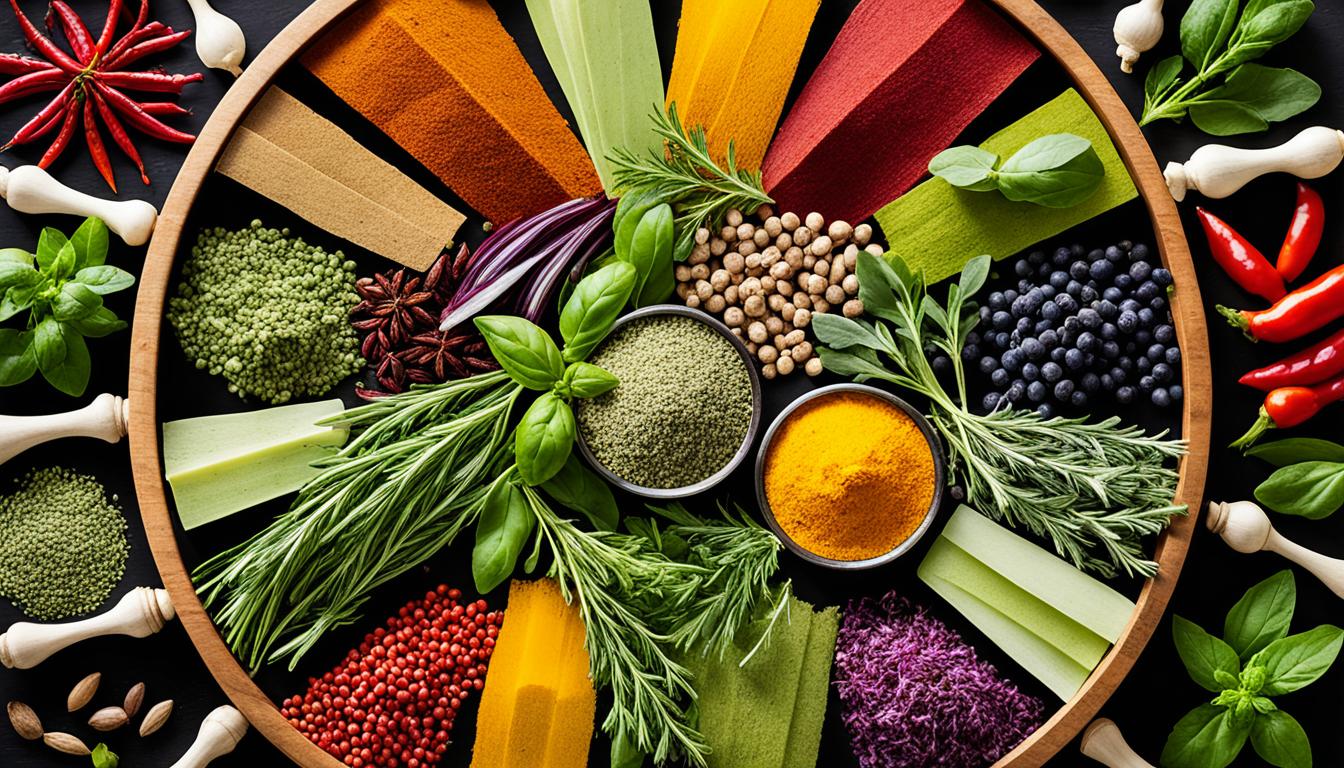Fresh Herbs and Spices: Flavor Your Meals Naturally
Who says healthy eating has to be bland? Elevate your meals with the vibrant flavors of fresh herbs and spices. Instead of relying solely on salt, explore the vast array of culinary aromatics that can transform your dishes into flavorful masterpieces. But did you know that these natural seasonings can also offer potential health benefits? Discover how to unlock the true power of herbs and spices in your kitchen.
Key Takeaways
- Herbs and spices can add flavor to meals without excessive salt
- Cooking with fresh herbs and spices may offer potential health benefits
- Explore a variety of herbs and spices to create unique, global-inspired flavors
- Incorporate turmeric, ginger, and garlic to enjoy the versatility of these superfoods
- Be mindful of heartburn triggers when using certain seasonings
The Power of Herbs and Spices
Herbs and spices are more than just flavor enhancers – they can also offer potential health benefits. Many herbs and spices possess antioxidant, anti-inflammatory, and antimicrobial properties that may contribute to their positive effects on human health.
Potential Health Benefits
Numerous studies have explored the potential health benefits of incorporating herbs and spices into our diets. Here are some of the key ways they may support our well-being:
- Antioxidant Properties: Herbs and spices like rosemary, turmeric, and oregano are rich in antioxidants, which can help neutralize harmful free radicals and protect cells from oxidative stress.
- Anti-Inflammatory Effects: Ginger, garlic, and turmeric have shown promising anti-inflammatory properties, which may help reduce inflammation and alleviate conditions like arthritis, aches, and pains.
- Antimicrobial Benefits: Certain herbs and spices, such as oregano, thyme, and cinnamon, possess antimicrobial properties that can inhibit the growth of harmful bacteria, viruses, and fungi.
- Boosting Immunity: Some herbs and spices, like garlic and ginger, have been associated with enhanced immune function, potentially helping the body fight off infections and illnesses.
While fresh herbs and spices tend to have higher nutritional content, their dried counterparts can still provide valuable health benefits when incorporated into your meals. The key is to experiment with a variety of herbs and spices to enjoy their unique flavors and potential health-promoting effects.
“Herbs and spices are not only flavorful, but they can also be powerful allies in supporting our overall health and well-being.”
Unlocking Flavor with fresh herbs and spices
In the realm of enhancing flavor with herbs and spices, cooking enthusiasts have an abundance of options to explore. Whether you’re the household meal planner or preparing one-off recipes for yourself, incorporating fresh herbs and aromatic spices can add a new dimension of vibrant taste profiles to your culinary creations.
With a simple sprinkle of fresh or dried herbs or a twist of ground black pepper, the world of healthier cooking opens up, allowing you to reduce sodium while still delivering delightful flavors. Herbs like rosemary, parsley, and cilantro pack a flavorful punch when added to recipes, while spices like black pepper, cinnamon, ginger, and cumin lend depth and complexity to your dishes.
Aromatic vegetables, such as onions, garlic, and bell peppers, can also play a crucial role in enhancing flavor with herbs and spices. These ingredients add complexity to your dishes without the need for excessive salt. Furthermore, a touch of citrus juice or zest can brighten up your meals, providing a refreshing and balanced flavor profile.
| Herb/Spice | Flavor Profile | Culinary Uses |
|---|---|---|
| Rosemary | Earthy, piney, and slightly minty | Roasted meats, potatoes, soups, and stews |
| Parsley | Fresh, bright, and slightly peppery | Salads, sauces, garnishes, and marinades |
| Cilantro | Citrusy, slightly floral, and slightly peppery | Mexican and Asian dishes, salsas, and chutneys |
| Black Pepper | Pungent, spicy, and slightly earthy | Seasoning for meats, vegetables, and sauces |
By exploring the diverse world of herbs and spices, home cooks can unlock a new realm of enhancing flavor and healthier cooking options, allowing them to create vibrant taste profiles that delight the senses.
Exploring Herbs and Spices
Black Pepper
Black pepper is a common and versatile spice that not only adds a distinctive kick to our dishes but may also offer potential health benefits. This humble spice is a rich source of antioxidants, substances that can help prevent damage to our body’s cells and reduce oxidative stress.
One of the most active components in black pepper is piperine, which some studies suggest may have the ability to scavenge free radicals – unstable molecules that can contribute to cell damage. While more research is still needed to fully understand the health implications of black pepper, adding freshly ground pepper to your meals is an easy and accessible way to enhance both the flavor and potentially the nutritional value of your food.
Whether you’re seasoning your meats, sprinkling it over roasted vegetables, or mixing it into dressings and sauces, black pepper is a common herb or spice that can help you explore the world of common herbs and spices and their antioxidant properties. So don’t be afraid to liberally sprinkle this versatile spice and reap the potential black pepper benefits of reducing oxidative stress.

“The simplest things can be made extraordinary if you pay enough attention to them.”
– Khaled Hosseini
Turmeric: A Golden Treasure
Incorporating Turmeric
Turmeric has a rich history of medicinal use, dating back at least 4,000 years. This golden-hued herb is widely used in Southeast Asian cuisines, and its popularity has now spread worldwide. Turmeric’s potential health properties have been the subject of thousands of studies, making it a true golden treasure.
One of the most studied compounds in turmeric is curcumin, along with other related compounds called curcuminoids. These components of turmeric have been found to possess antioxidant, anti-inflammatory, antiviral, antibacterial, and antifungal properties. Research suggests that curcumin may have potential activity against conditions such as cancer, diabetes, arthritis, and Alzheimer’s disease.
Adding turmeric to your diet is easy and can provide a range of potential benefits. Here are some simple ways to incorporate this versatile spice into your meals:
- Sprinkle turmeric powder onto roasted vegetables, rice, or egg and tofu scrambles.
- Add turmeric to soups, stews, or curries for a vibrant color and earthy flavor.
- Blend turmeric into smoothies or brew it into a comforting tea.
- Use turmeric as a natural food coloring in baked goods or homemade condiments.
By incorporating this golden spice into your diet, you can harness the potential health benefits of turmeric and add a burst of flavor to your meals.
“Turmeric is an auspicious plant in both Aryan and Dravidian cultures, with a long history of medicinal use in South Asia.”
Ginger: A Spicy Superfood
Ginger, a close relative of the vibrant turmeric, has been a staple in traditional medicine and culinary practices for centuries. This versatile spice offers an array of ginger health benefits, making it a true superfood. From its distinctive warming and zesty flavors to its remarkable anti-nausea properties, ginger has rightfully earned its place as a kitchen essential.
One of ginger’s most well-known uses is for alleviating nausea and vomiting. Studies have consistently shown ginger’s efficacy in treating morning sickness, motion sickness, and even the nausea associated with chemotherapy. Its active compounds, such as gingerol, work to calm the digestive system and reduce inflammatory responses that can trigger these unpleasant symptoms.
Beyond its anti-nausea properties, ginger is also celebrated for its versatile cooking uses. This aromatic root pairs beautifully with both savory and sweet dishes, lending its earthy, zesty flavors to everything from stir-fries and curries to baked goods and warm beverages. Try incorporating ginger into roasted root vegetables, seafood, poultry, and even holiday favorites like gingersnap cookies or ginger tea.
| Ginger Health Benefits | Research Findings |
|---|---|
| Anti-nausea properties | Ginger has consistently shown efficacy in treating nausea, including nausea caused by morning sickness and chemotherapy. |
| Anti-inflammatory effects | Ginger’s active compounds, such as gingerol, have been found to have potent anti-inflammatory properties. |
| Potential anti-cancer benefits | Ginger contains antioxidants and compounds that may help inhibit the growth of certain types of cancer cells. |
| Improved heart health | Studies suggest that ginger may help lower cholesterol and triglyceride levels, potentially reducing the risk of heart disease. |
Whether you’re looking to harness ginger’s anti-nausea properties, incorporate its versatile cooking uses, or simply enjoy its warming and zesty flavors, this remarkable spice is a true kitchen powerhouse. Explore the many ways to incorporate ginger into your daily life and experience the benefits of this spicy superfood.
“Ginger is a wonderful, flavorful addition to both sweet and savory dishes. Its warm, earthy notes complement a wide range of ingredients, making it a versatile and essential spice in any kitchen.”
Garlic: A Flavorful Powerhouse
Garlic is a versatile and flavorful spice that has long been celebrated for its culinary and potential health benefits. This pungent member of the allium family not only adds a distinctive aroma and taste to dishes, but it also boasts an impressive array of garlic health properties, including antioxidant and anti-inflammatory effects.
Harnessing the Benefits of Garlic
Numerous studies have explored the potential health benefits of garlic, indicating that this humble ingredient may offer a range of therapeutic effects. Garlic is known for its antioxidant capacity, which can help neutralize harmful free radicals and support overall wellness. Additionally, garlic has demonstrated anti-inflammatory properties, making it a potentially useful tool in managing certain health conditions.
When it comes to incorporating garlic into your diet, you have the option of dietary versus supplemental garlic. While garlic supplements can provide a concentrated dose of the active compounds, there is something to be said for the benefits of enjoying fresh garlic in cooking. By adding sliced, pressed, or crushed garlic to your favorite dishes, you can not only enhance the flavor but also potentially harness the full spectrum of garlic’s therapeutic potential.
It’s important to note that, as with any supplement or dietary change, you should consult your primary care provider before making significant adjustments, especially if you have any underlying health conditions or are taking prescription medications. They can provide guidance on the best approach to incorporating fresh garlic in cooking or the appropriate use of garlic supplements to support your overall health and wellbeing.
“Garlic is not only a savory addition to meals, but it may also offer valuable health benefits when consumed as part of a balanced diet.”
By understanding the garlic health properties and exploring ways to incorporate this versatile ingredient into your culinary adventures, you can embark on a flavorful journey that may also support your overall wellness. Whether you choose to enjoy the pungent aroma and taste of fresh garlic or opt for supplemental forms, the potential antioxidant and anti-inflammatory effects of this powerhouse spice are certainly worth exploring.
Navigating Heartburn and GERD
Living with digestive disruptions like heartburn can be uncomfortable, but understanding which herbs and spices may exacerbate your symptoms can provide relief. Heartburn and gastroesophageal reflux disease (GERD) affect up to 20% of Americans, causing stomach contents to leak backward into the esophagus, leading to burning sensations and nausea.
Avoiding Trigger Foods
To manage GERD and heartburn, it’s essential to identify and avoid trigger foods. Spicy, acidic, and fatty foods, as well as caffeinated beverages and alcohol, can all worsen symptoms. Keeping a food diary can help you pinpoint the specific items that amplify your discomfort, allowing you to make more informed dietary choices.
In addition to monitoring your diet, speaking with your healthcare provider can provide valuable insights and guidance on effectively managing your condition. They may recommend lifestyle changes, such as adjusting your eating habits or losing weight, to help alleviate heartburn and GERD symptoms.
